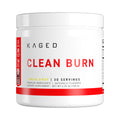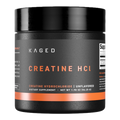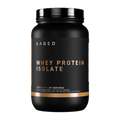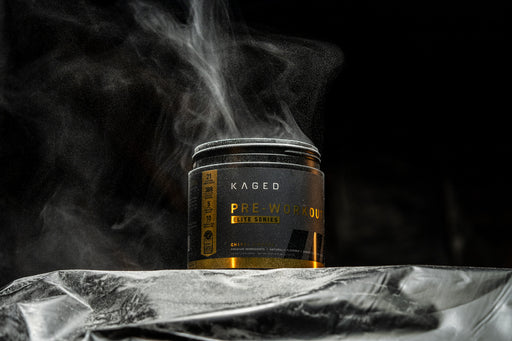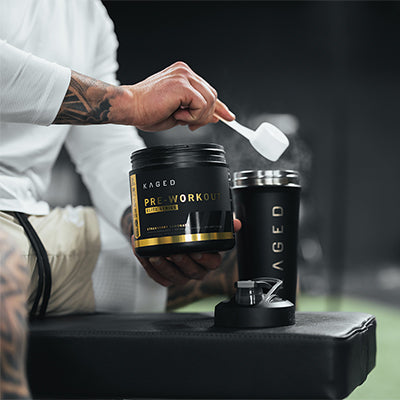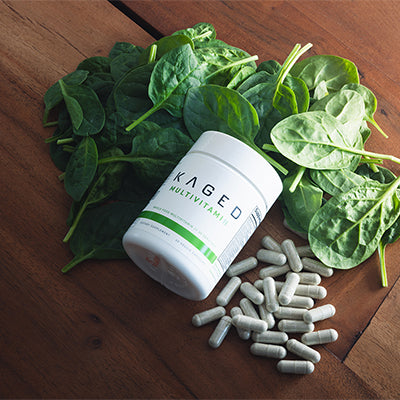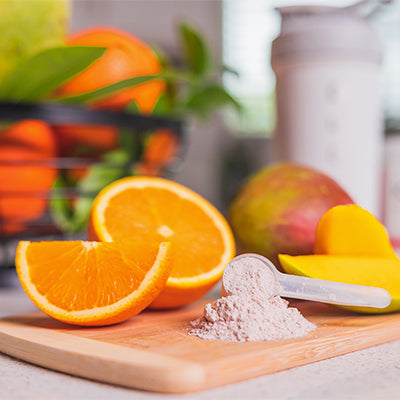Every year new magical supplements enter the market - while 99% of these may be a waste of time, there is one new supplement which is taking the exercise science field by storm. This particular supplement is Betaine, obtained in the diet via the muscle building vegetable, Beetroots (sorry popeye!).
The patented supplement version of betaine is BetaPower™, a purified form of anhydrous betaine which we use in PRE-KAGED. This secret supplement has some exciting research supporting its use, showing it can improve physical performance, especially strength, power and muscle endurance.
BetaPower™ is the preferred choice for athletes and bodybuilder wishing to reap the benefits of betaine for several reasons. Firstly, to obtain the research proven amount from beetroots, you would need to eat 5 whole beetroots before EVERY workout. BetaPower™ is also the patented form of betaine, used in the clinical studies that examine the effect of betaine on performance and muscle growth. BetaPower™ must contain a minimum of 99% pure betaine, the patented product also ensures the highest quality which is free from harmful chemicals and contaminates.
Remember, BetaPower™ is just the patented form of the ingredient Betaine, so these two words are often used inter-changeably.
The Benefits of BetaPower™
BetaPower™ or Betaine has many health and performance benefits. In short, research has shown betaine can (see references below for more details):
- Increase strength
- Increase power
- Increase muscle mass
- Increase aerobic capacity
- Help with high blood pressure
- Aid cardiovascular health
- Reduce the oxygen demand of exercise, meaning you can work more efficiently
- Improve aerobic exercise performance
- May reduce your rate of perceived exertion (e.g. how hard an exercise feels).
- Reduce inflammation
- Increase skeletal muscle creatine content
- with preliminary data in kidney health, help with increased blood flow and have anti-ageing properties.
As you can see, Betaine or BetaPower™ has many benefits, including both health, physique and performance.
How does BetaPower™ work?
The benefits of BetaPower™ are due to Betaine, a derivative of amino acid glycine. Betaine is known as an osmolyte and methyl donor. While the osmolyte aspect helps protect cells, proteins and enzymes from environmental stress, the methyl donor aspect can aid in performance.
As a methyl donor, betaine participates in the methionine cycle which can assist the synthesis of creatine. This is one of the primary mechanisms behind Betapower™ and Betaine’s performance enhancing effects. Methionine may also play a role in muscle protein synthesis and translation, which again, could aid in body composition and performance.
How BetaPower™ can help you in the gym
Several studies have recently investigated the use of Betaine or BetaPower™ in gym based exercise.
Study 1:
Hoffman et al. (2009), a leading researchers in the field of exercise science investigated 15 days of Betaine supplement on performance.
Participants were provided with the Betaine supplement or a placebo following baseline tests. After 15 days, they re-assessed these measurements and found a significant increase in squat repetitions performance (white bars = placebo, black bars = betaine supplement).
Study 2:
Another study by Lee et al. (2010) investigated 14 day Betaine supplement in young men. Subjects performed high intensity strength and power exercises, including bench press, squats and jump tests. Following these initial measures (baseline) they supplemented for 14 days and re tested. They found a significant increase in bench press throw power, isometric bench press force, vertical jump power and isometric squat force.
Study 3:
Trepanowski et al. (2011) also investigated Betaine supplement over a 14 day period. Similar to the other 2 studies, they measured an array of performance markers including power tests, isometric force tests and muscular endurance tests. Following the 14 day supplementation, participants significantly increased total repetitions and total volume load on the 10-set bench press protocol as measured with a paired t-test.
Although not of statistical significance, post exercise blood lactate increased to a lesser extent with betaine supplementation (210%) compared with placebo administration (270%). This may demonstrate the ability of Betaine to buffer hydrogen ions as lactic acid levels are correlated to hydrogen ion increase.
Hydrogen ions increase with every rep we perform, which puts the muscle in an acidic environment and causes decreased power and the burn / fatigue you experience at the gym. As you can see in the graph, as the muscle PH drops from 7.0, absolute force / power rapidly decreases.
By reducing the hydrogen ions and acidity, you may be able to perform more reps at a higher intensity and more total volume per workout, which is a key mechanism behind muscle growth (Schoenfeld et al. 2012).
Summary:
Betaine or BetaPower™ research suggests it may aid in cardiovascular health, blood flow and exercise performance. Although it is still in the early days of research, initial findings are very positive, with it being one of the few supplements that can aid in both health AND performance. Remember to look for the patented brand, BetaPower™, which is guaranteed to provide the highest quality Betaine.
To supplement with this, take around 1.5g of BetaPower™ or PRE-KAGED (which includes BetaPower™), 30 – 60 minutes pre workout.
References:
Armstrong LE, Casa DJ, Roti MW, Lee EC, Craig SA, Sutherland JW, Fiala KA, Maresh CM. Influence of betaine consumption on strenuous running and sprinting in a hot environment. J Strength Cond Res. 2008;22:851–60.
Craig SAS. Betaine in human nutrition. Am J Clin Nutr. 2004;80:539–549.
Delgado-Reyes CV, Wallig MA, Garrow TA. Immunohistochemical detection of betaine-homocysteine S-methyltransferase in human, pig, and rat liver and kidney. Arch Biochem Biophys. 2001;393:184–186. doi: 10.1006/abbi.2001.2474.
Detopoulou P, Panagiotakos DB, Antonopoulou S, Pitsavos C, Stefanadis C. Dietary choline and betaine intakes in relation to concentrations of inflammatory markers in healthy adults: the ATTICA study. Am J Clin Nutr. 2008;87:424–430.
du Vigneaud V, Simonds S, Chandler JP, Cohn M. A further investigation of the role of betaine in transmethylation reactions in vivo. J Biol Chem. 1946;165:639–648.
Eklund M, Bauer E, Wamatu J, Mosenthin R. Potential nutritional and physiological functions of betaine in livestock. Nutr Res Rev. 2005;18:31–48. doi: 10.1079/NRR200493.
Fernandez-Figares I, Wray-Cahen D, Steele NC, Campbell RG, Hall DD, Virtanen E, Caperna TJ. Effect of dietary betaine on nutrient utilization and partitioning in the young growing feed-restricted pit. J Anim Sci. 2002;80:421–428.
Hoffman JR, Kang J. Strength changes during an inseason resistance training program for football. J Strength Cond Res. 2003;17:109–114. doi: 10.1519/1533-4287(2003)017<0109:SCDAIS>2.0.CO;2.
Hoffman JR, Ratamess NA, Kang J, Mangine G, Faigenbaum AD, Stout JR. Effect of Creatine and β-Alanine Supplementation on Performance and Endocrine Responses in Strength/Power Athletes. Int J Sport Nutr Exerc Metab. 2006;16:430–446.
Hoffman JR, Stout JR. Performance-Enhancing Substances. In: Earle RW, Baechle TR, editor. Essentials of Strength and Conditioning. 3. Human Kinetics: Champaign, IL; 2008. pp. 179–200.
Hoffman JR, Wendell M, Cooper J, Kang J. Comparison between linear and nonlinear inseason training programs in freshman football players. J Strength Cond Res. 2003;17:561–565. doi: 10.1519/1533-4287(2003)017<0561:CBLANI>2.0.CO;2.
Hoffman JR. Norms for Fitness, Performance, and Health. Human Kinetics: Champaign, IL; 2006.
Liversedge LA. Glycocyamine and betaine in motor-neuron disease. Lancet. 1956;2:1136–1138. doi: 10.1016/S0140-6736(56)90154-4.
Maresh CM, Farrell MJ, Kraemer WJ, Yamamoto LM, Lee EC, Armstrong LE, Hatfield DL, Sokmen B, Diaz JC, Speiring BA, Anderson JA, Volek JS. The effects of betaine supplementation on strength and power performance. Med Sci Sports Exerc. 2008;39:S101.
McNair DM, Lorr M, Droppleman LF. Profile of Mood States Manual. San Diego, CA: Educational and Industrial Testing Service; 1971.
Olthof MR, van Vliet T, Boelsma E, Verhoef P. Low dose betaine supplementation leads to immediate and long term lowering of plasma homocysteine in healthy men and women. J Nutr. 2003;133:4135–4138.
Olthof MR, Verhoef P. Effects of betaine intake on plasma homocysteine concentrations and consequences for health. Current Drug Metab. 2005;6:15–22. doi: 10.2174/1389200052997366.
Storch KJ, Wagner DA, Young VR. Methionine kinetics in adult men: effects of dietary betaine on L-[2H3-methyl-l-13C] methionine. Am J Clin Nutr. 1991;54:386–394
Virtanen E. Piecing together the betaine puzzle. Feed Mix. 1995;3:12–17.
Warren LK, Lawrence LM, Thompson KN. The influence of betaine on untrained and trained horses exercising to fatigue. J Anim Sci. 1999;77:677–684.
Wilder N, Gilders R, Hagerman F, Deivert RG. The effects of a 10-week, periodized, off-season resistance-training program and creatine supplementation among collegiate football players. J Strength Cond Res. 2002;16:343–352. doi: 10.1519/1533-4287(2002)016<0343:TEOAWP>2.0.CO;2.
Wise CK, Cooney CA, Ali SF, Poirier LA. Measuring S-adensylmethionine in whole blood, red blood cells and cultured cells using a fast preparation method and high-performance chromatography. J Chromatogr B Biomed Sci Appl. 1997;696:145–152. doi: 10.1016/S0378-4347(97)00213-2
Wray-Cahen D, Fernández-Fígares I, Virtanen E, Steele NC, Caperna TJ. Betaine improves growth, but does not induce whole body or hepatic palmitate oxidation in swine (Sus scrofa domestica) Comp Biochem Physiol A Mol Integr Physiol. 2004;137:131–140. doi: 10.1016/j.cbpb.2003.09.015.
Zahn A, Li JX, Xu ZR, Zhao RQ. Effects of methionine and betaine supplementation on growth performance, carcase composition and metabolism of lipids in male broilers. Br Poult Sci. 2006;47:576–580. doi: 10.1080/00071660600963438.
Zeisel SH, Mar MH, Howe JC, Holden JM. Concentrations of choline-containing compounds and betaine in common foods. J Nutr. 2003;133:1302–130.

